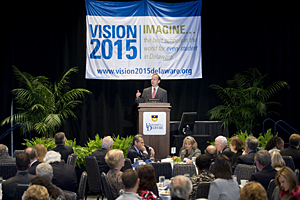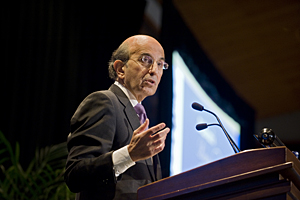ADVERTISEMENT
- Rozovsky wins prestigious NSF Early Career Award
- UD students meet alumni, experience 'closing bell' at NYSE
- Newark Police seek assistance in identifying suspects in robbery
- Rivlin says bipartisan budget action, stronger budget rules key to reversing debt
- Stink bugs shouldn't pose problem until late summer
- Gao to honor Placido Domingo in Washington performance
- Adopt-A-Highway project keeps Lewes road clean
- WVUD's Radiothon fundraiser runs April 1-10
- W.D. Snodgrass Symposium to honor Pulitzer winner
- New guide helps cancer patients manage symptoms
- UD in the News, March 25, 2011
- For the Record, March 25, 2011
- Public opinion expert discusses world views of U.S. in Global Agenda series
- Congressional delegation, dean laud Center for Community Research and Service program
- Center for Political Communication sets symposium on politics, entertainment
- Students work to raise funds, awareness of domestic violence
- Equestrian team wins regional championship in Western riding
- Markell, Harker stress importance of agriculture to Delaware's economy
- Carol A. Ammon MBA Case Competition winners announced
- Prof presents blood-clotting studies at Gordon Research Conference
- Sexual Assault Awareness Month events, programs announced
- Stay connected with Sea Grant, CEOE e-newsletter
- A message to UD regarding the tragedy in Japan
- More News >>
- March 31-May 14: REP stages Neil Simon's 'The Good Doctor'
- April 2: Newark plans annual 'wine and dine'
- April 5: Expert perspective on U.S. health care
- April 5: Comedian Ace Guillen to visit Scrounge
- April 6, May 4: School of Nursing sponsors research lecture series
- April 6-May 4: Confucius Institute presents Chinese Film Series on Wednesdays
- April 6: IPCC's Pachauri to discuss sustainable development in DENIN Dialogue Series
- April 7: 'WVUDstock' radiothon concert announced
- April 8: English Language Institute presents 'Arts in Translation'
- April 9: Green and Healthy Living Expo planned at The Bob
- April 9: Center for Political Communication to host Onion editor
- April 10: Alumni Easter Egg-stravaganza planned
- April 11: CDS session to focus on visual assistive technologies
- April 12: T.J. Stiles to speak at UDLA annual dinner
- April 15, 16: Annual UD push lawnmower tune-up scheduled
- April 15, 16: Master Players series presents iMusic 4, China Magpie
- April 15, 16: Delaware Symphony, UD chorus to perform Mahler work
- April 18: Former NFL Coach Bill Cowher featured in UD Speaks
- April 21-24: Sesame Street Live brings Elmo and friends to The Bob
- April 30: Save the date for Ag Day 2011 at UD
- April 30: Symposium to consider 'Frontiers at the Chemistry-Biology Interface'
- April 30-May 1: Relay for Life set at Delaware Field House
- May 4: Delaware Membrane Protein Symposium announced
- May 5: Northwestern University's Leon Keer to deliver Kerr lecture
- May 7: Women's volleyball team to host second annual Spring Fling
- Through May 3: SPPA announces speakers for 10th annual lecture series
- Through May 4: Global Agenda sees U.S. through others' eyes; World Bank president to speak
- Through May 4: 'Research on Race, Ethnicity, Culture' topic of series
- Through May 9: Black American Studies announces lecture series
- Through May 11: 'Challenges in Jewish Culture' lecture series announced
- Through May 11: Area Studies research featured in speaker series
- Through June 5: 'Andy Warhol: Behind the Camera' on view in Old College Gallery
- Through July 15: 'Bodyscapes' on view at Mechanical Hall Gallery
- More What's Happening >>
- UD calendar >>
- Middle States evaluation team on campus April 5
- Phipps named HR Liaison of the Quarter
- Senior wins iPad for participating in assessment study
- April 19: Procurement Services schedules information sessions
- UD Bookstore announces spring break hours
- HealthyU Wellness Program encourages employees to 'Step into Spring'
- April 8-29: Faculty roundtable series considers student engagement
- GRE is changing; learn more at April 15 info session
- April 30: UD Evening with Blue Rocks set for employees
- Morris Library to be open 24/7 during final exams
- More Campus FYI >>
Editor's note: To view video from this confernce, including Joel Klein's keynote address, click here.
6:14 p.m., Sept. 29, 2010----Delaware Gov. Jack Markell and Joel L. Klein, chancellor of the New York City Public Schools, addressed the national Race to the Top education funding program during the Delaware's Race to Deliver -- Vision 2015 Leadership Forum, held Tuesday, Sept. 28, at Clayton Hall on the University of Delaware campus in Newark.
Markell said that although it was a great achievement for the state of Delaware to be awarded with the Race to the Top grants -- the state will receive about $100 million over the next four years to support reform and innovation in public and charter schools -- the recognition and finances are only the beginning and that a lot of hard work still lies ahead.
“The work is hard, it is complex, and it is going to demand levels of collaboration that we have rarely seen or experienced in public educational improvement,” Markell said. “ Change is not easy, but in this case, it is required. We have to raise our sights and raise our standards.”
Markell highlighted three key aspects that are needed to improve education -- better teacher appraisal systems, better student testing and better academic standards.
Stressing that today's students are competing against not just their peers in Delaware or in the United States but rather throughout the world, Markell said that better testing is necessary to better prepare students to succeed.
Said Markell of new testing procedures, “At first we are likely to see children's proficiency ratings in the state-wide assessment go down as a result of this change, but that's because we've changed the scoring to better reflect how much our students need to know to compete in this new world. Because to tell our kids that they're proficient on a test that we give inside Delaware's boundaries, knowing that they would not be proficient when compared to peers outside of Delaware's boundaries, is not being honest.
“It's as if we're shooting at a basketball hoop that's only 6 feet high when the rest of the world is shooting at 10-foot baskets. When you raise the hoop, you may lower the initial percentage of shots that you make, but we're never going to improve unless we do so.”
Chancellor Klein
Klein began his remarks by congratulating Delaware on its hard work with regard to education before focusing on how to improve the educational system.
Klein discussed the difficult issue of accountability and compensation for teachers.
It is important to consider “the professionalization of teaching, treating teachers truly as professionals, differentiating based on merit,” Klein said.
“I have got to pay my math and science teachers more because I'm short on math and science teachers, and when my kids are short on math and science teachers, we're short in high needs, high poverty communities,” Klein said. “It's not that I want to insult anyone else, but my kids are not getting adequate math and science teaching, and so we have to differentiate.
“We have to be candid about it and we need a system that really is built about core accountability principles.”
Klein also spoke about the need to attract more high end professionals to teaching positions across the country, saying that one of the most important questions that parents of students need to ask is, “Would I want that person teaching my student?”
Finishing his talk, Klein said, “I hope I've stirred the pot some, so that if you think about Race to the Top, if you think about the children in Delaware, you think about how you can create an educational system that is precisely the one you would want for your own children. Once we get a system that we insist on for all of our children, we will be where we need to go.”
Earlier in the day
UD President Patrick Harker opened the conference by noting that the University's new College of Education and Human Development is “already helping to drive K-12 policy, programming and interventions.
“I know it will be an indispensible resource for schools as we tackle the tough challenges of world-class standards and assessments, instructional improvement and teacher effectiveness, leadership development, longitudinal data tracking and school turnaround.”
In opening remarks, Lillian Lowery, secretary of education in Delaware, spoke about the moral imperative of the task ahead. “This must be done because it is right,” she said. “This work is about the children who walk through the doors of school each day.”
Lending a national perspective, Brad Jupp, senior program adviser in the U.S. Department of Education, said that change in education is not a “top-down initiative” but one that needs to come up from the states, the school districts, the schools and the teachers.
“You have an extraordinary convergence here today in Delaware. You have created an extraordinary set of circumstances, an extraordinary set of opportunities."
The time for negotiation is past, and now is the time for problem-solving, he said, advising the participants to set their sights on their goals and to set themselves in forward motion.
“You can't accomplish anything by staying in the same place,” Jupp said. “I hope you can see today as a beginning, as a start of a revolution in Delaware. This is the first day, and we're going to do it together.”
Article by Adam Thomas
Photos by Kathy Atkinson and Evan Krape




